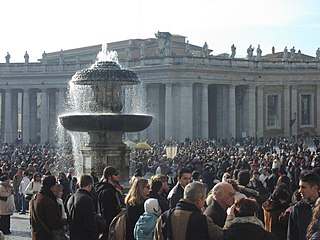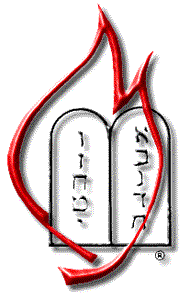Canon law is a set of ordinances and regulations made by ecclesiastical authority for the government of a Christian organization or church and its members. It is the internal ecclesiastical law, or operational policy, governing the Catholic Church, the Eastern Orthodox and Oriental Orthodox churches, and the individual national churches within the Anglican Communion. The way that such church law is legislated, interpreted and at times adjudicated varies widely among these four bodies of churches. In all three traditions, a canon was originally a rule adopted by a church council; these canons formed the foundation of canon law.
The Roman Curia comprises the administrative institutions of the Holy See and the central body through which the affairs of the Roman Catholic Church are conducted. The Roman Curia is the institution which the Roman Pontiff ordinarily makes use of in the exercise of his supreme pastoral office and universal mission in the world. It is at the service of the Pope, successor of Peter, and of the Bishops, successors of the Apostles, according to the modalities that are proper to the nature of each one, fulfilling their function with an evangelical spirit, working for the good and at the service of communion, unity and edification of the Universal Church and attending to the demands of the world in which the Church is called to fulfill its mission.
Religious law includes ethical and moral codes taught by religious traditions. Different religious systems hold sacred law in a greater or lesser degree of importance to their belief systems, with some being explicitly antinomian whereas others are nomistic or "legalistic" in nature. In particular, religions such as Judaism, Islam and the Baháʼí Faith teach the need for revealed positive law for both state and society, whereas other religions such as Christianity generally reject the idea that this is necessary or desirable and instead emphasise the eternal moral precepts of divine law over the civil, ceremonial or judicial aspects, which may have been annulled as in theologies of grace over law.
The hierarchy of the Catholic Church consists of its bishops, priests, and deacons. In the ecclesiological sense of the term, "hierarchy" strictly means the "holy ordering" of the church, the Body of Christ, so to respect the diversity of gifts and ministries necessary for genuine unity.
A deanery is an ecclesiastical entity in the Catholic Church, the Eastern Orthodox Church, the Anglican Communion, the Evangelical Church in Germany, and the Church of Norway. A deanery is either the jurisdiction or residence of a dean.
The canon law of the Catholic Church is "how the Church organizes and governs herself". It is the system of laws and ecclesiastical legal principles made and enforced by the hierarchical authorities of the Catholic Church to regulate its external organization and government and to order and direct the activities of Catholics toward the mission of the Church. It was the first modern Western legal system and is the oldest continuously functioning legal system in the West, while the unique traditions of Eastern Catholic canon law govern the 23 Eastern Catholic particular churches sui iuris.
In the Catholic Church, a declaration of nullity, commonly called an annulment and less commonly a decree of nullity, and in some cases, a Catholic divorce, is an ecclesiastical tribunal determination and judgment that a marriage was invalidly contracted or, less frequently, a judgment that ordination was invalidly conferred.

Joseph Nathaniel Perry is an American prelate of the Roman Catholic Church who served as an auxiliary bishop for the Archdiocese of Chicago from 1998 to 2023.

The priesthood is the office of the ministers of religion, who have been commissioned ("ordained") with the Holy orders of the Catholic Church. Technically, bishops are a priestly order as well; however, in layman's terms priest refers only to presbyters and pastors. The church's doctrine also sometimes refers to all baptised (lay) members as the "common priesthood", which can be confused with the ministerial priesthood of the consecrated clergy.
In the Catholic Church, a parish is a stable community of the faithful within a particular church, whose pastoral care has been entrusted to a parish priest, under the authority of the diocesan bishop. It is the lowest ecclesiastical subdivision in the Catholic episcopal polity, and the primary constituent unit of a diocese or eparchy. Parishes are extant in both the Latin and Eastern Catholic Churches. In the 1983 Code of Canon Law, parishes are constituted under cc. 515–552, entitled "Parishes, Pastors, and Parochial Vicars."

The Association for Slavic, East European, and Eurasian Studies (ASEEES) is a scholarly society "dedicated to advancing knowledge about Central Asia, the Caucasus, Russia, and Eastern Europe in regional and global contexts." The ASEEES supports teaching, research, and publication relating to the peoples and territories within this area.
The American Medical Informatics Association (AMIA), is an American non-profit organization dedicated to the development and application of biomedical and health informatics in the support of patient care, teaching, research, and health care administration.

John Denver Faris is an American Chorbishop of the Syriac Maronite Church of Antioch, serving the Maronite Catholic Eparchy of Saint Maron of Brooklyn, headquartered in Brooklyn, New York. He is a canon lawyer of the Eastern Catholic Churches, and an expert called upon for dialogue between the Catholic Church and the Eastern Christian Churches.

The Alabama State Bar is the integrated (mandatory) bar association of the U.S. state of Alabama.
Precedence signifies the right to enjoy a prerogative of honor before other persons; for example, to have the most distinguished place in a procession, a ceremony, or an assembly, to have the right to express an opinion, cast a vote, or append a signature before others, to perform the most honorable offices.
Canon 915, one of the canons in the 1983 Code of Canon Law of the Latin Church of the Catholic Church, forbids the administration of Holy Communion to those upon whom the penalty of excommunication or interdict has been imposed or declared, or who obstinately persist in manifest grave sin:
Those who have been excommunicated or interdicted after the imposition or declaration of the penalty and others obstinately persevering in manifest grave sin are not to be admitted to holy communion.
The Jurist: Studies in Church Law and Ministry or simply The Jurist is a peer-reviewed academic journal and the only journal published in the United States devoted to the study and promotion of the canon law of the Catholic Church. It was initiated in 1940 to serve the academic and professional needs of Catholic church lawyers. It originally focused on the canon law of the Latin Church, but came to include Eastern Catholic canon law as well.

Catholic laity are the ordinary members of the Catholic Church who are neither clergy nor recipients of Holy Orders or vowed to life in a religious order or congregation. Their mission, according to the Second Vatican Council, is to "sanctify the world".
The Catholic University of America School of Canon Law is the only faculty of Catholic canon law in the United States. It is one of the twelve schools at Catholic University of America, located in Washington, D.C., and one of the three ecclesiastical schools at the university, together with the School of Theology and Religious Studies and the School of Philosophy. The school is part of the main campus in the Brookland neighborhood in Northeast D.C. and is housed in Caldwell Hall. It offers the Licentiate of Canon Law and the Doctor of Canon Law ecclesiastical degrees, as well as civil and joint ecclesiastical-civil degree programs.







